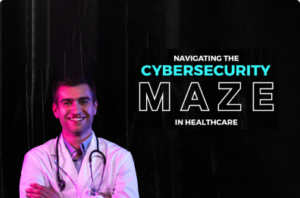Healthcare cybersecurity has become an increasingly important issue in recent years as the healthcare industry has become more reliant on technology to store and manage sensitive patient information. Healthcare organizations have become prime targets for cybercriminals looking to steal valuable data and disrupt healthcare operations. Therefore, it is crucial to strengthen defenses against cyber-attacks to ensure patient safety and maintain the integrity of healthcare systems.
The healthcare industry has become a prime target for cyber attacks due to the high value of patient data. Healthcare organizations store vast amounts of sensitive patient data, including personal identification information, medical records, and financial information. This data can be used for identity theft, insurance fraud, and other malicious activities. Cybercriminals can also disrupt healthcare operations, causing significant harm to patients and the healthcare system.
PeoplActive is an ISO 27001:2013 certified leading tech hiring platform. By utilizing an exclusive network of 4000+ Silicon Valley calibre tech talent specialized in 100+ in-demand IT skills, it was pretty easy for businesses to hire game-changing engineers and developers in just 48 hours. So, if you want to accelerate your business, schedule a quick call with our experts now.
The Vital Role of Cybersecurity in Modern Healthcare
The healthcare industry has become increasingly reliant on technology to store and manage sensitive patient data. Electronic health records (EHRs), medical devices, and other healthcare systems store vast amounts of patient data, including personal identification information, medical histories, and financial information. This data is valuable to cybercriminals, who can use it for identity theft, insurance fraud, and other malicious activities. Additionally, cyber attacks can disrupt healthcare operations, causing harm to patients and the healthcare system.
Healthcare organizations must prioritize cybersecurity to protect patient data and maintain the trust of their patients. A cyber attack can cause significant harm to patients, including exposure to sensitive health information, medical errors, and delayed treatment. Additionally, healthcare organizations may face legal and financial consequences, damage to their reputation, and loss of patient trust in the event of a cyber attack.
The healthcare industry’s reliance on technology has made it vulnerable to cyber-attacks. Healthcare organizations use a variety of systems, such as electronic health records (EHRs), medical devices, and mobile devices, to store and manage patient data. These systems are connected to the internet and can be accessed remotely, making them vulnerable to cyber-attacks. Additionally, many healthcare organizations lack the resources and expertise to adequately protect their systems from cyber threats.
Some best practices for healthcare cybersecurity
Therefore, healthcare organizations must take steps to strengthen their defenses against cyber attacks.
The following are some best practices for healthcare cybersecurity:
Conduct Risk Assessments
Healthcare organizations should conduct risk assessments regularly to identify vulnerabilities in their systems. Risk assessments can help healthcare organizations identify potential threats and vulnerabilities, evaluate the likelihood and impact of a cyber attack, and prioritize their cybersecurity efforts. Risk assessments should be conducted regularly and should be updated as new threats emerge.
Develop and Implement a Cybersecurity Plan
Healthcare organizations should develop and implement a cybersecurity plan that outlines the organization’s policies, procedures, and guidelines for protecting patient data. The cybersecurity plan should include procedures for detecting and responding to cyber-attacks, as well as contingency plans for restoring operations in the event of a cyber attack.
Train Employees on Cybersecurity
Healthcare organizations should provide regular cybersecurity training to their employees to ensure they are aware of the risks of cyber attacks and how to protect patient data. Training should include information on how to identify and report potential security incidents, as well as best practices for securing devices and data.
Encrypt Data
Healthcare organizations should encrypt patient data to protect it from unauthorized access. Encryption is the process of converting data into code that can only be read with a decryption key. Encryption helps protect patient data in case of a breach, as the data cannot be read without the decryption key.
Implement Access Controls
Healthcare organizations should implement access controls to ensure that only authorized personnel can access patient data. Access controls can include password protection, two-factor authentication, and other security measures that restrict access to sensitive data.
Monitor Systems for Suspicious Activity
Healthcare organizations should monitor their systems for suspicious activity, such as unusual login attempts, data access, or data transfer. Monitoring can help identify potential security incidents and allow organizations to take action before a breach occurs.
Use Up-to-Date Software and Security Patches
Healthcare organizations should use up-to-date software and security patches to protect their systems from known vulnerabilities. Software vendors regularly release security patches that address known vulnerabilities, and healthcare organizations should install these patches promptly to reduce their risk of a cyber attack.
Conduct Regular Security Audits
Healthcare organizations should conduct regular security audits to evaluate the effectiveness of their cybersecurity efforts. Security audits can help identify vulnerabilities that may have been missed in previous risk assessments and help organizations prioritize their cybersecurity efforts.
Develop Incident Response Plans
Healthcare organizations should develop incident response plans that outline the organization’s procedures for responding to a cyber attack. The incident response plan should include procedures for notifying patients, law enforcement, and other stakeholders.
Wrapping it up
In today’s digital age, cybercrime is an ever-evolving threat that can bring even the mightiest of companies to their knees. The stakes are high, and all it takes is one vulnerability for the entire organization to crumble. But fear not, for there is a solution – a Cyber Security Ninja. These experts are trained to detect and neutralize cyber threats before they can wreak havoc on your company. Don’t wait until it’s too late. Hire a Cyber Security Expert within 48 hours to safeguard your business and protect it from the dangers of the digital world.
Take Actions Immediately!

















